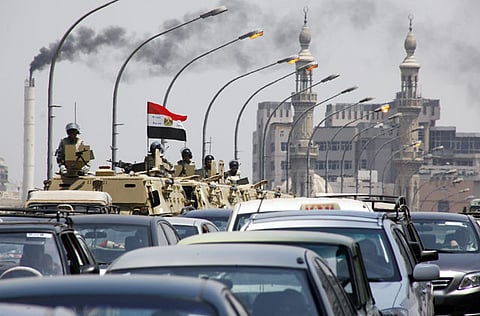Egyptians don't want to migrate after revolution
Survey shows 88% of people are optimistic and intend to stay back

Dubai: Contrary to the anticipation that the Arab Spring, which took a bloody turn in some parts of the Arab region, would encourage the majority of Arabs to flee their countries, they won’t.
Most Arabs, especially Egyptians, now prefer to stay in their country although many still are moving to live in Saudi Arabia and UAE, the two Gulf states that attract the most Arab migrants, said researchers.
“We have conducted three polls in Egypt since the revolution, and found a constant higher rate of people who want to stay in the country,” said Mohammad Younis, senior analyst and consultant at Gallup.
“A Gallup survey conducted after the overthrow of former Egyptian president Hosni Mubarak hints at this possibility [staying in the country],” wrote a recent published survey by Gallup on the migration to the Arab Gulf countries, specifically to both UAE and Saudi Arabia.
“Eighty eight per cent of Egyptians said they intended to remain in the country permanently, versus 75 per cent who said the same when Mubarak was still in office,” it added.
Hope
Before the ousting of Mubarak’s regime in February, Younis explained in an interview with Gulf News, people wanted to migrate because of the economic hardships. But after the revolution, their hope in the country have gone up.
However, Younis explained that the example of Egypt, the most populous Arab country with nearly 85 million people, does not necessarily apply to other Arab countries, such as the Tunisia. The Northern African country was the first to oust its president in what was called later the Arab Spring, a term to describe the protests against several regimes in the Arab region.
The Gallup study, on the other hand, showed that both the UAE and Saudi Arabia are among the top high income destinations for people around the world.
Destination
The survey covered 347,713 adults across multiple administrations of surveys in 147 countries between 2007 and 2009.
“While Saudi Arabia and the UAE share a common need for migrant labour, potential migrants to GCC countries are most likely to want to move to Saudi Arabia. Fifty-two per cent list Saudi Arabia as their top desired destination. The UAE is the second most desired destination, cited by 35 per cent of potential migrants to the GCC,” the study said.
For Saudi Arabia, the main nationalities of those interested in migrating to the Kingdom are from Asia, Sub-Saharan African and Middle East and North Africa region.
Compared with Saudi Arabia, the UAE has fewer potential migrants in Asia and Sub-Saharan African than in Saudi Arabia, but more from MENA region and slightly higher from Europe.
Indians show a particular interest in the UAE, representing 26 per cent of all people who would like to move there permanently, as do Egyptians and Pakistanis, with 13 per cent and 9 per cent respectively, the study noted.
Migration
The study, said Younis, is to compare the two Gulf states, which has proved to be a magnet for potential migrants, “with other high income countries that are also big magnets for migrants like the US, Australia, Canada, and some European countries like France and Switzerland.”
Interestingly, he added, there is “not very much difference” between those who want to move to Saudi Arabia and UAE, and those seeking to move to US.
“For example, if you look at the educational level, you don’t see a lot of differences... In some way, they are similar,” he said.
“In some ways, we found that Saudi Arabia and UAE are very similar to some high income countries,” Younis said, noting that the survey didn’t include people who are living in the two Arab states, but those want to move there.
Understanding the kind of people the two countries are attracting is important as both nations are developing economies and in the phase of formulating policies. They will are able to determine the type of jobs that are available for migrants to fill.
“What is important is that the people they are attracting are fitting with the jobs that are available in their economies”, Younis said.



